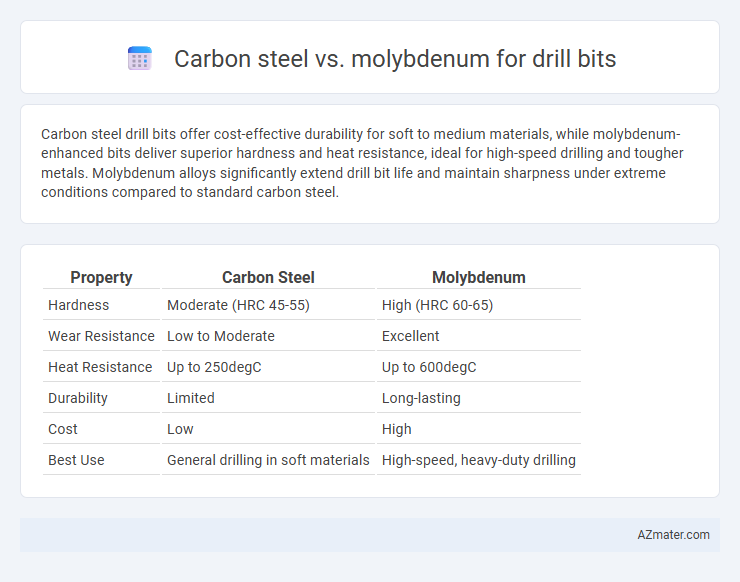Carbon steel drill bits offer cost-effective durability for soft to medium materials, while molybdenum-enhanced bits deliver superior hardness and heat resistance, ideal for high-speed drilling and tougher metals. Molybdenum alloys significantly extend drill bit life and maintain sharpness under extreme conditions compared to standard carbon steel.
Table of Comparison
| Property | Carbon Steel | Molybdenum |
|---|---|---|
| Hardness | Moderate (HRC 45-55) | High (HRC 60-65) |
| Wear Resistance | Low to Moderate | Excellent |
| Heat Resistance | Up to 250degC | Up to 600degC |
| Durability | Limited | Long-lasting |
| Cost | Low | High |
| Best Use | General drilling in soft materials | High-speed, heavy-duty drilling |
Overview: Carbon Steel vs. Molybdenum in Drill Bit Manufacturing
Carbon steel drill bits offer affordability and good hardness but tend to lose sharpness quickly and corrode under heavy use. Molybdenum-enhanced drill bits provide superior wear resistance and higher heat tolerance, extending tool life in demanding drilling conditions. The choice between carbon steel and molybdenum depends on the application's intensity, cost considerations, and required durability.
Chemical Composition and Material Properties
Carbon steel drill bits typically contain 0.6-1.0% carbon, providing hardness and moderate toughness, but they lack resistance to high heat and wear. Molybdenum drill bits incorporate about 0.2-0.5% molybdenum, enhancing strength, hardness, and heat resistance due to molybdenum's ability to improve steel's microstructure and oxidation resistance. The presence of molybdenum increases durability and performance in demanding drilling applications, making these bits more suitable for hard and abrasive materials compared to standard carbon steel.
Hardness and Durability Comparison
Carbon steel drill bits offer moderate hardness and durability, making them suitable for soft materials but prone to wear and dulling under heavy use. Molybdenum-enhanced drill bits provide superior hardness due to molybdenum's alloying properties, resulting in increased strength and resistance to heat and wear. This enhanced durability allows molybdenum drill bits to maintain sharpness longer and perform effectively in tougher materials and demanding drilling conditions.
Heat Resistance and Performance Under Stress
Molybdenum drill bits exhibit superior heat resistance compared to carbon steel, maintaining structural integrity and sharpness at higher temperatures during prolonged drilling tasks. Carbon steel drill bits tend to soften and lose edge retention quicker under intense heat stress, reducing overall performance and tool life. The enhanced alloy composition of molybdenum provides improved toughness and durability, making it the preferred choice for high-stress, high-temperature drilling applications.
Corrosion Resistance Capabilities
Molybdenum drill bits exhibit superior corrosion resistance compared to carbon steel due to their enhanced ability to withstand oxidation and chemical degradation. The presence of molybdenum forms a passive oxide layer that protects the tool from rust and wear in harsh environments. Carbon steel drill bits, while strong and cost-effective, are more prone to corrosion under exposure to moisture and acidic conditions, leading to reduced tool life.
Cost-Effectiveness and Accessibility
Carbon steel drill bits offer superior cost-effectiveness due to their lower manufacturing costs and widespread availability, making them an economical choice for general-purpose drilling in soft materials. Molybdenum drill bits, enriched with molybdenum alloying, provide enhanced hardness and wear resistance, leading to longer tool life in demanding applications but at a higher upfront price and reduced accessibility. Selection between these materials hinges on balancing initial expenditure against durability needs, with carbon steel favored for budget-conscious projects and molybdenum for performance-driven tasks requiring extended bit longevity.
Application Suitability: When to Use Carbon Steel or Molybdenum
Carbon steel drill bits are best suited for drilling soft materials like wood, plastic, and mild steel due to their affordability and good sharpness retention. Molybdenum-enhanced drill bits excel in applications involving tougher materials such as stainless steel and cast iron, offering superior heat resistance and durability. Choose carbon steel for general-purpose, low-stress drilling tasks and opt for molybdenum steel when working with harder metals or when high temperature and wear resistance are critical.
Maintenance, Sharpening, and Lifespan
Carbon steel drill bits require frequent maintenance and sharpening due to their lower hardness and faster wear rate, making them less durable for heavy-duty use. Molybdenum steel drill bits, enhanced with alloying elements, offer superior wear resistance and retain sharpness longer, significantly reducing maintenance intervals. The extended lifespan of molybdenum-infused bits results in cost-effective performance, especially in high-stress drilling applications.
Environmental Impact and Sustainability
Carbon steel drill bits have a higher environmental footprint due to their energy-intensive production and lower lifespan, leading to more frequent replacements and increased waste. Molybdenum-enhanced drill bits offer greater durability and corrosion resistance, reducing the need for frequent disposal and conserving raw materials over time. The sustainability advantage of molybdenum lies in its ability to extend tool life and improve efficiency, minimizing resource consumption and environmental impact in industrial drilling applications.
User Recommendations and Buying Guide
Carbon steel drill bits offer excellent affordability and sharpness for light-duty tasks and soft materials, making them ideal for DIY enthusiasts and occasional use. Molybdenum drill bits provide enhanced hardness, heat resistance, and durability, suitable for professional users working with tougher metals and prolonged drilling sessions. When buying, prioritize molybdenum bits for heavy industrial applications and carbon steel bits for budget-friendly projects requiring less wear resistance.

Infographic: Carbon steel vs Molybdenum for Drill bit
 azmater.com
azmater.com